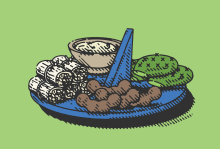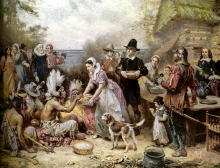thankfulness

“HAY MÁS TIEMPO que vida” was my dad’s refrain every time I was stressed and weary. “There is more time than life.” His simple words had profound implications.
Being present to life is difficult. Life demands that we “rise and grind.” Reward comes to those who make the most of the time they’ve been given. Time is money. Time is a commodity we trade. The promise of life is the goal of all this grinding—or retirement, if we are privileged.
During the pandemic, I’ve pushed against beliefs that commodify time. I’ve cooked the foods that nourished my ancestors: tamales verdes, atole de tamarindo, and nopalitos. My senses have been awakened through mixing the nixtamalized corn flour with water and fat until it reached the right texture, peeling and deseeding each tamarind pod, cutting the nopal (cactus) and cooking it with a few tomatillo husks to remove the slime.
The preparation of these foods forces me to notice the rough spots on the cacti where thorns still make their home, to smell the acid scent of tamarind in the pulp clinging to my fingers; it invites me to play with the unruly dough that believes its place is on top of the corn husk and not inside. If death shows up in separation, life sprouts in connection.

Woodiwiss: We're coming up on Good Friday and Easter. And a lot of strains of Christianity teach the story of Good Friday as, “God also gave us this gift of Jesus’ death. It was horrible, but Jesus did it to pay for our sins, so we have to worship him.” There's this implied debt.
Bass: It makes absolutely no theological moral or biblical sense at all. So where do we get that? It's very complicated, but Protestantism was built on this idea of faith: On one hand, they said that salvation was a free gift, that it was the act of grace. On the other hand, they complicated that free gift with this idea of economic exchange.
3. Historically, Men Translated the Odyssey. Here’s What Happened When a Woman Took the Job
“It offers not just a new version of the poem, but a new way of thinking about it in the context of gender and power relationships today. As Wilson puts it, ‘the question of who matters is actually central to what the text is about.’”

I didn’t realize the promise I vowed to myself — to never to live out of step with my values, to always live with passion and bring life into the world — would be a tall order; an impossibly high standard that could turn into, “I need to do and experience everything as quickly as possible so that I don’t waste time.”
Over the past 10 years, this experience developed an impulse to “hurry up” and “do more.” I overextended myself in too many activities the next few years, developed an anxiety and depression disorder, and shamed myself for living in this anxious state when I “should” be living it joyfully to the full.
Through therapy and medication, I got much better, but was still lusting after experiencing everything. Time never seems to be on your side when you’re living like you might die tomorrow. Life never seems long enough when you act like it will stop at the same minute as your heart, forgetting about all I’ve been taught about life after death.

James was playing cards with several other nursing home residents in a room that doubles as their dining area. The “stakes” for their game was a stash of candy from a Christmas party earlier in the day. He saw me and waved me over. James grabbed one of the candy canes in his pile and offered it with his right hand, the one that had L-O-V-E spelled out on the backs of his four fingers with a self-applied tattoo.
“Would you like some candy?” he said.
James was short, thin, in his 40s. His most distinctive features were those homemade tattoos on his fingers, hands and forearms. And the outline of a metal plate protruding from his lower right leg.
An auto accident left the leg mangled. He didn’t have medical insurance to cover the enormous hospital bills. He couldn’t stand on the leg as it healed, so he lost his job as a cook. And soon, his apartment. He was living on the streets, sharing needles and drugs to deaden the pain in his leg. He wound up sharing someone’s AIDS as well.
But that’s not why he was dying. He’d developed cancer. There was nothing they could do.
I got to know James as part of my work as a hospice volunteer. He only slowly warmed to me — all that time on the streets made him wary of people and their motives. He didn‘t trust very much.
But now he was offering me a candy cane.

I’m not suggesting we not be thankful. But if it were up to me, I’d repeal the official day of Thanksgiving that was sanctioned by Congress because no matter how we want to re-tell or re-write that story, we are marking an event of injustice.
In removing this day, I’d encourage the whole country to express sorrow for such a grave injustice to the Native Indians and create events and various forms of curriculum in parallel. I’d express gratitude and celebration of the story and legacy of the native Indian people. And I’d put into law that ensures reparation for every single descendant of Native Indians. Furthermore, I’d create a fund to guarantee 100% funding to college for any descendants of Native Indians. This is just for starters….
In my opinion, our treatment of the Native Indians is one of the greatest human tragedies and to ignore its story and context may be the pinnacle of historical revisionism.